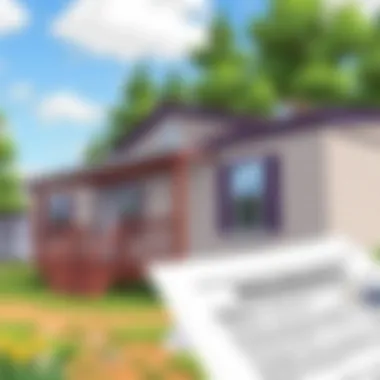Navigating Homeowners Insurance for Mobile Homes


Intro
When it comes to securing a roof over your head, the twists and turns of homeowners insurance can feel especially complicated for those dwelling in mobile homes. Mobile homes often fetch a mixed perception; some view them as affordable alternatives, while others harbor concerns about their long-term stability and safety. In the midst of these opinions lies the need for a solid understanding of homeowners insurance specifically designed for mobile homes.
This specialized insurance is not merely an afterthought but a critical component that ensures your investment—and peace of mind—are well protected. Distinct risks come with mobile home living that aren't as prevalent in traditional housing, which makes tailored insurance coverage paramount.
Throughout this article, we will take a closer look at various aspects such as the types of coverage available, the unique risks associated with mobile homes, and factors that could sway your premium rates. Regardless if you're a prospective buyer or a long-term mobile homeowner, understanding these elements is important to make informed decisions. Common claim scenarios will also be discussed, giving you a realistic view of how claims function in the realm of mobile home ownership. Along the way, we'll point out the importance of being thorough with policy details to prevent any unwelcome surprises down the line. This overview aims to empower you with valuable insights and actionable steps that can help you navigate the mobile home insurance landscape with confidence.
Prologue to Homeowners Insurance for Mobile Homes
Homeowners insurance serves as a crucial safeguard for those living in mobile homes, addressing unique risks that arise from this specific type of dwelling. Unlike traditional homes, mobile homes come with their own set of challenges that necessitate customized coverage solutions. Understanding these specifics is vital not just for protection but also for financial planning.
In mobile home parks, for instance, many residents share common areas and infrastructure, such as roads and utility lines. This shared environment can affect how insurance policies are structured. Those living in mobile homes might find themselves facing different types of hazards—like wind damage from storms or issues related to transportation—that are less common for standard brick-and-mortar houses.
Moreover, homeowners insurance extends beyond just property damage. It typically includes liability coverage that protects homeowners from potential lawsuits. A slip-and-fall accident on the property, for example, could lead to significant expenses if the aggrieved party decides to take legal action. This is something every mobile homeowner should keenly keep in mind.
Another point of consideration is the customization of these policies. Mobile home insurance can vary dramatically based on the specific features, age, and condition of the home. Aspects like whether the home is permanently affixed to a foundation or is transported periodically can significantly influence the type of coverage best suited for the homeowner.
"Mobile homes are often considered underrated investments. However, incorrect assumptions about insurance can leave homeowners vulnerable to financial hardships."
In summary, grasping the intricacies of homeowners insurance for mobile homes is essential for anyone looking at either purchasing a mobile home or protecting their existing investment. Understanding types of coverage, liability concerns, and how to tailor a policy to one's own circumstances can help navigate the complexities involved.
As we delve deeper into this article, we will explore the definition of mobile homes, their common features, and the regulatory framework surrounding them. This groundwork will set the stage for comprehending the unique risks associated with mobile homes, allowing readers to be better prepared and informed.
Understanding Mobile Homes
Understanding mobile homes is crucial when considering homeowners insurance tailored specifically for these structures. Mobile homes, while often more affordable than traditional homes, come with unique needs and risks that insurance policies must address. A comprehensive grasp of mobile homes facilitates informed decision-making not only for current mobile homeowners but also for potential buyers. This section elaborates on the specific elements, benefits, and considerations regarding mobile homes.
Definition and Types
Mobile homes are often termed as manufactured homes and are built in a factory before being transported to a specific site. They are constructed in compliance with the U.S. Department of Housing and Urban Development (HUD) standards. There are various types of mobile homes:
- Single-Wide Homes: These are the classic form, usually 18 feet wide or less. They are more economical and easier to move.
- Double-Wide Homes: Wider at approximately twice the width of a single-wide, these homes provide more living space. They're delivered in two sections placed side by side.
- Triple-Wide Homes: Offering even more space than double-wide homes, these structures are three times the average width. They often resemble traditional homes more closely.
Understanding these categories not just helps in identification but is valuable for assessing insurance options as each type can present different risks and insurance requirements.
Common Features of Mobile Homes
Mobile homes are known for specific characteristics that set them apart from conventional houses. Some common features include:
- Mobility: As the name suggests, they can be relocated, but this often affects their value and insurance coverage.
- Construction Materials: Often made from lighter materials like vinyl siding, which can affect durability against various risks.
- Size and Layout Variability: The flexible design options lead to diverse layouts, influencing coverage choices.
- Heating and Cooling Systems: Typically use electric or gas systems which may have different insurance implications.
These features underscore the need for tailored insurance coverage that can adequately protect against potential hazards and risks affiliated with mobile home lifestyle.
Regulatory Framework
The regulatory framework for mobile homes is primarily governed by HUD guidelines, which set the baseline standards for the construction and safety of manufactured homes. Beyond federal regulations, state and local laws can impose specific rules regarding zoning, placement, and safety inspections.
Key points include:
- HUD Code: This is the federal standard that all manufactured homes must adhere to, ensuring safety, quality, and durability.
- State Regulations: Each state might have its own laws that pertain to mobile home parks, rights, and responsibilities of owners, as well as insurance requirements.
- Licensing and Permits: Owners often need to secure permits for installation, relocation, or any modifications.
Understanding the regulatory landscape is essential for homeowners to ensure compliance and maximize coverage under their insurance policies.
Unique Risks and Challenges
When it comes to mobile homes, understanding the unique risks and challenges in this realm of homeowners insurance is paramount. Mobile homes, often designed for both flexibility and affordability, come with a set of vulnerabilities that traditional homes may not face. Knowing these risks helps homeowners tailor their insurance needs effectively.
Weather-Related Risks
In many places, the weather can be a fickle friend. Mobile homes tend to be more susceptible to extreme weather conditions compared to traditional houses. Strong winds, heavy snow, and torrential rain can wreak havoc on mobile homes. For instance, tornadoes or hurricanes can lift and transport these homes, causing significant damage where they land.
A prime example can be seen along the Gulf Coast, where storms and hurricanes frequently threaten mobile home parks. Flooding is another critical concern; mobile homes located in flood-prone areas can face damage swiftly, often leading to financial setbacks.
“The essential point is this: knowing your region’s weather patterns will allow you to better assess the insurance coverage necessary for your mobile home.”
Given these environmental risks, mobile homeowners should consider purchasing additional insurance products to cover weather-related damages. This can include flood insurance—something often overlooked, but vital in ensuring adequate protection.
Fire Hazards
Fires are not just a concern for homeowners in traditional residences; they pose a significant risk in mobile homes, too. The materials used in mobile home construction can facilitate faster spread of fire, leading to higher damage. While the reasons for a fire can vary—from faulty wiring to unattended cooking—mobile homes often have less defensible positions against such disasters.
In fact, according to the U.S. Fire Administration, mobile homes can be at risk of catching fire faster than conventional homes due to their construction materials. As things heat up, awareness of this danger becomes crucial. Mobile homeowners ought to establish a fire safety plan and consider having functioning smoke detectors. Most importantly, investing in a homeowners insurance policy that includes specific fire-related coverage can save a person from devastating losses.
Other Environmental Factors
Beyond weather and fire risks, other environmental factors can impact mobile home insurance requirements. For example, pests like termites can pose a significant threat, leading to structural damage if not properly managed. Regular maintenance and inspections are critical in this regard.
Additionally, pollution and environmental hazards such as nearby factories or landfills should be evaluated. Contaminants can affect the value of a property, especially in mobile home parks where the proximity to such hazards can deter potential buyers or renters.
A risk assessment, including potential environmental hazards unique to your area, can inform decisions about necessary coverages and endorsements.
In summary, the unique risks associated with mobile home living demand proactive engagement from owners. A clear understanding of weather-related risks, fire hazards, and environmental factors can lead to better policy customization and informed decision-making. This foundation sets the stage for creating a resilient protection strategy tailored for mobile homes.


Types of Homeowners Insurance Coverage Available
When it comes to insuring mobile homes, understanding the types of homeowners insurance coverage available is foundational. Each type of coverage addresses specific risks and unique needs that come with mobile living, ensuring that you are not left high and dry should disaster strike. Making sense of these coverages helps homeowners choose the best protection tailored to their specific situation, which can ultimately be a financial lifesaver.
Liability Coverage
Liability coverage is a crucial component of homeowners insurance that protects you against lawsuits for bodily injury or property damage that you or other members of your household might cause. For mobile homeowners, this is particularly important. Imagine a scenario where a guest slips and falls on your property. Without adequate liability coverage, you may find yourself facing hefty medical bills or legal fees. In most policies, liability coverage often includes legal defense costs, which can pile up quickly in a court scenario.
"Liability coverage isn’t just a checkbox on your insurance; it’s your safety net against financial ruin."
Personal Property Protection
Personal property protection, as the name suggests, covers your belongings inside the mobile home. This can include furniture, clothing, electronics, and other items that reflect your lifestyle. It’s essential to keep an inventory of your personal items with their replacement values to ensure that you can claim the right amount in case of theft or damage. Policies usually have limits on the payout for certain items, such as jewelry or collectibles, so it’s wise to discuss any particular high-value items with your insurance agent. To protect everything you hold dear, carefully consider the details of what your personal property protection covers.
Dwelling Coverage
Dwelling coverage is fundamentally about protecting the structure of your mobile home itself. It's important because mobile homes, while often resilient, can suffer significant damage from storms, fires, or other disasters. If your mobile home were to be damaged beyond repair, dwelling coverage ensures that you can either repair it or find a new home. This coverage typically provides reimbursement based on the actual cash value or replacement cost of your mobile home.
When selecting dwelling coverage, don’t forget to account for aspects like exterior attachments—like porches or skirting—since these can also incur costs for repair or replacement.
Additional Living Expenses
Sometimes, damage to your mobile home can make it uninhabitable. Additional living expenses (ALE) coverage comes into play in such situations, covering the cost of temporary housing, food, and other living expenses while repairs are being made. Not all policies provide this coverage, so it’s essential to understand the terms before signing on the dotted line.
ALE can be a lifesaver; for instance, if you need to stay in a hotel for several weeks following a flood, your additional living expenses coverage would help foot the bill, thereby relieving financial stress during an already challenging time.
In summary, selecting the right types of homeowners insurance coverage is about foreseeing potential risks and protecting your mobile home and assets accordingly. By investing time in understanding these coverages, mobile homeowners can make informed choices that safeguard their investments and provide peace of mind.
Factors Influencing Premium Rates
The realm of insurance is often seen as muddy waters, but understanding the factors that influence premium rates for mobile homeowners can drown out some of that confusion. These premium rates play a significant role in everyday budgeting and financial planning for mobile home owners. Knowing what affects these costs not only informs your purchasing decisions but also equips you to make more astute negotiations with insurance providers.
Location Considerations
When it comes to premiums, your location is a heavyweight factor. Urban areas might see higher premiums mainly due to increased risk of theft, vandalism, and other urban-related threats. Conversely, rural locations, while possibly offering a lower baseline premium, could potentially face risks related to natural disasters like floods or wildfires, depending on local climate and geography.
Considerations include:
- Zoning Regulations: Local laws can influence insurance requirements.
- Proximity to Emergency Services: Living near fire stations or emergency medical services can lower your premium.
- Neighborhood Risk Levels: Insurers assess crime rates and overall safety of an area to determine risk.
In some cases, cities prone to severe weather events might require additional coverage, affecting premium calculations. Therefore, a homeowner living in a coastal zone with a high chance of hurricanes could expect to pay significantly more than someone in an inland area with a milder climate.
"Location isn't just where you park your mobile home; it’s written all over your insurance bill."
Home Characteristics
The details of your mobile home play a direct role in determining your insurance costs. From the age of the home to its construction material, these attributes provide insight into potential risks and repairs.
Factors to consider:
- Age and Condition: Older homes might not meet current safety standards, increasing odds of claims.
- Construction Material: For instance, homes made from durable materials like steel might attract lower premiums due to resilience against damage.
- Size and Layout: More square footage or extra features, such as decks or outbuildings, often lead to higher replacement costs and can affect premium.
In essence, the more vulnerable your home appears on paper, the higher the likelihood of elevated costs.
Insurance History
Just like a credit score can influence a loan, your insurance history affects premium rates. Insurers review your previous claims, payment patterns, and even lapses in coverage. A solid history of maintaining insurance without claims tells insurers that you're a low-risk customer, which can help keep those premiums in check.
Key points in this arena include:
- Prior Claims: Frequent claims can lead to higher premiums, as they indicate a higher likelihood of future claims.
- Lapsing Coverage: Letting your insurance coverage lapse or showing gaps can signal to insurers that you may be unreliable, which could push up your premium.
- Policy Type: Ongoing agreements with a single provider often reward loyalty, sometimes with reduced rates.
Understanding these elements of your insurance history helps you recognize how past behaviors shape your current situation, ensuring you can strategize accordingly to save costs in the long run.
Customizing Your Policy
When it comes to homeowners insurance for mobile homes, customizing your policy isn't just a nice-to-have; it’s dang near essential. Every mobile home comes with its unique set of risks and living preferences. Off-the-shelf insurance may not provide the coverage that truly reflects your situation. Thus, understanding the ins and outs of customizing your policy is critical for safeguarding your investment.
Understanding Policy Limits
Policy limits dictate how much the insurance company will pay in the event of a claim. Think of it like a budget for your protection. If a disaster strikes, like a tornado whipping through town, and you haven’t set your limits high enough, you might find yourself in a tight spot financially.
Choosing the right limits involves evaluating your mobile home’s value, along with the cost of your belongings. This means not only considering the replacement cost of your home and fixtures but also ensuring you have enough for anything valuable that’s tucked away. For example:
- Home Value: Get an up-to-date appraisal to know exactly how much your mobile home is worth.
- Contents Coverage: Take inventory of your belongings. What would it cost to replace your furniture, electronics, and other personal items?
Finding the right balance can take some time, but an insurance agent can help clarify limits and determine what works best for you.
Choosing Deductibles Wisely
Selecting a deductible is akin to deciding how much you're willing to pay before your insurance kicks in. A higher deductible often means a lower premium, which sounds like a win, right? But if disaster strikes, can you shell out that larger amount comfortably? Here’s how to think about it:
- Your Financial Situation: Assess your savings and comfort level. If you're on shaky ground financially, a lower deductible might be your best bet.
- Risk Factors: Evaluate the risks in your area. If you live in a region prone to floods or wildfires, choosing a lower deductible can spare you a big financial headache when disaster hits.


It's not just about choosing the lower or higher number; it's about what aligns with your financial stability and risk tolerance.
Endorsements and Riders
Endorsements and riders are additional coverages you can add to your policy to enhance your protection. This is especially important for mobile homes, where standard coverage might not fully protect you. Here’s a deeper dive:
- What They Are: An endorsement modifies your policy’s terms, while riders add specific coverage that isn’t included in the standard policy.
- Common Add-Ons:
- Flood Insurance: Many standard policies don’t cover flooding, which is crucial depending on your geographical region.
- Malicious Mischief: If you're in a high-crime area, adding this rider can protect your property from vandalism.
Adding endorsements tailor your policy further to ensure you're not left high and dry when an unexpected incident occurs. Always discuss these options with your agent, as what’s essential for you might not be for someone else.
Lasting Insight: Investing time in customizing your homeowners insurance policy can make all the difference when you need it most. In an unpredictable world, tailored coverage provides peace of mind.
Essential Tips for Choosing the Right Coverage
When it comes to selecting homeowners insurance for mobile homes, it’s not just about picking a policy off a website or calling it in. It's a nuanced process that deserves thoughtful consideration. Understanding what coverage options are available and how they relate specifically to mobile homes is crucial for ensuring adequate protection. Here, we’ll dissect some essential tips that will guide you through choosing the right coverage, giving you peace of mind.
Analyzing Coverage Needs
The first step in this maze of options is to assess your individual coverage needs. Knocking on the door of your own requirements often reveals surprising insights. Think about the following aspects:
- Value of your mobile home: This includes renovations or improvements you've made over the years.
- Personal belongings: Consider what you own and how much it would cost to replace everything in case of a total loss.
- Liabilities: Assess your potential liabilities. If someone gets injured on your property, you’d want sufficient liability coverage.
By taking stock of these factors, you can determine the rightful amount of insurance necessary to cover both your mobile home and personal property. Remember, underinsuring can leave you in a bind during tough times, while overinsuring just eats away at your finances each month.
Comparing Policies
Once you have clarity on your coverage needs, it’s time to play the field—carefully comparing available policies. Don't just take a glance. Dive deep into the particulars rather than just focusing on the premium costs. Here are a few points to scrutinize:
- Coverage limits: Ensure these limits align with your requirements. A policy with a lower limit might seem appealing in price only.
- Exclusions: Some plans may cover specific situations, while others don’t. Knowing what isn't covered is just as important as knowing what is.
- Deductibles: Consider what amount you'd be willing to pay out of pocket in case of a claim. A lower deductible typically means higher premiums.
In the end, compiling this information neatly might allow you to make an informed choice that resonates with your unique situation. Just don’t get stuck in analysis paralysis—find a middle ground that feels right.
Involving an Insurance Agent
Engaging with an insurance agent can be a game changer in your decision-making journey. This professional can act as a knowledgeable guide through the maze of policies and options available. Here’s how to make the most of that relationship:
- Ask Questions: Get clarity on the substantiated facts. Questions about terms, conditions, and coverage nuances can expose details you may have missed.
- Tailored Advice: An agent will customize recommendations based on your unique situation, ensuring coverage isn't simply cookie-cutter.
- Claims Assistance: They can guide you through the claims process if and when that time comes. Having a go-to person makes the whole ordeal less daunting.
All in all, an agent can arm you with insight that transcends mere numerical figures, enabling you to navigate the insurance landscape with a little more confidence and clarity.
It’s essential to not just source the cheapest policy but to ensure it precisely meets your needs. Always take the time to evaluate before committing.
Common Claims Scenarios
Understanding common claims scenarios is vital for anyone considering or currently holding homeowners insurance for mobile homes. By knowing the prevalent risks and potential claims, homeowners can better prepare for the intricacies of their coverage. With mobile homes presenting unique challenges, comprehending these scenarios can make all the difference in effectively navigating the insurance landscape. This section shall unpack three significant claims situations: natural disasters, thefts and vandalism, and accidental damages.
Natural Disasters
Mobile homes often face a heightened vulnerability to natural disasters compared to traditional homes. Whether it’s hurricanes, tornadoes, or flooding, these unpredictable events can leave considerable damage in their wake. In regions prone to such calamities, understanding your coverage becomes crucial.
Why This Matters:
- Financial Protection: If a hurricane blows through your area, having the right insurance can help cover significant repairs or even replace your home entirely.
- Location-Based Assessments: Insurers often consider running assessments based on geography; therefore, knowing how your locale may increase risk can help you tailor your policy correctly.
For example, a mobile home in Florida must have robust coverage against hurricanes, whereas a home in the Midwest may require specific protections for tornadoes. On this note, knowing how claims process after these disasters can provide you with peace of mind when planning for the unknown.
Thefts and Vandalism
The mobile home community often faces risks of theft and vandalism. Since many mobile homes are situated in parks or semi-urban areas, the chances of these incidents occurring can be significant. A home may seem like a target due to its transient nature, leaving owners in trepidation.
Key Considerations:
- Personal Property Coverage: Most policies offer personal property insurance which can replace stolen items. Be sure you understand what's covered so you can act quickly if something goes wrong.
- Security Measures: Implementing safety features can sometimes lead to a decrease in premiums. Nowadays, many insurers consider things like security cameras or alarm systems favorably.
For example, if your bike or lawn equipment were stolen, knowing the coverage limits in advance can prevent unnecessary complications in filing claims.
Accidental Damages
Accidents happen, and in the case of mobile homes, they can lead to significant repair needs suddenly. This includes anything from a stray ball breaking a window to spills that cause flooring damage. Mobile homes, being smaller, might experience these issues more intensely, making coverage for accidental damages imperative.
Important Aspects to Note:
- Understanding Policy Inclusions: Not all policies automatically include coverage for accidental damages. It’s crucial to ask your insurer about this aspect.
- Claim Process: Knowing how to file a claim efficiently can make the difference in receiving prompt repairs. Maintaining records of your home can be useful.
Impact of Location on Insurance Needs
When it comes to mobile home insurance, location is a key factor that shapes premium rates, coverage options, and the overall risk profile of a property. Understanding how your surroundings influence your insurance needs is crucial for anyone considering or currently living in a mobile home.
Urban vs. Rural Living
Living in an urban area usually means higher insurance premiums. There are several reasons for this reality. In cities, the density of people often correlates with an uptick in crime rates. The likelihood of theft or vandalism increases, compelling insurance companies to charge more in such regions.


Additionally, urban environments face unique risks like traffic-related accidents or natural disasters affecting larger populations. Property values tend to be higher in these areas, so the cost to rebuild also escalates.
On the flip side, rural living generally offers a more peaceful setting, which can lead to lower premiums. With less crime, families living in the countryside often benefit from having fewer unwanted guests and a reduced chance of property damage due to urban nuisances. However, rural properties might lack quick access to emergency services. This slower response time can be worrying during situations requiring immediate assistance.
Factors to consider in urban versus rural settings include:
- Safety ratings: urban areas can leave you with higher risks of theft.
- Emergency services access: urban residents have more immediate support in an emergency.
- Natural disaster risks: coastal cities may face hurricanes, while rural zones might contend with wildfires.
Regional Weather Patterns
Another pivotal aspect of how location impacts insurance needs revolves around regional weather patterns. Mobile homes can be particularly vulnerable to the whims of mother nature. For instance, if you're situated in a coastal area, your policy needs to account for hurricane damage potential. Similarly, those in tornado-prone regions, like parts of the Midwest or Southern Plains, should consider coverage that includes storm-specific damages.
Regardless of where you live, it’s important to identify localized risks. Here are a few patterns to watch:
- Flooding: Coastal and floodplain areas require specialized flood insurance.
- Earthquake: If you're in a quake-prone zone, securing additional earthquake coverage could be wise.
- Snowfall: In areas prone to heavy snowfall, consider the potential for roof collapse as a risk factor.
Understanding these elements helps homeowners align their coverage with the realities of their living environment. This matched approach can encourage a more informed selection of policies that provide adequate protection against life's surprises.
Understanding Policy Details
Understanding the particulars of your homeowners insurance policy is crucial for anyone residing in a mobile home. Unlike traditional properties, mobile homes come with their specific set of circumstances that influence coverage needs. Knowing the ins and outs of your policy can mean the difference between financial recovery and a stressful aftermath following a loss. Policy details encompass various elements including coverage limits, deductibles, and the precise terms under which claims are paid. In this section, we will shed light on what makes navigating policy details vital for mobile home owners.
Reading the Fine Print
When it comes to insurance policies, reading the fine print isn’t just a recommendation—it's a necessity. This section of the policy often contains vital information that can impact how much you’ll pay out of pocket in the event of a claim. For instance, the fine print may outline specific conditions under which losses are covered, or it may specify certain limits on claim payouts. Understanding these points ensures that you stay in the loop about what your policy will or won’t do for you.
Consider the scenarios:
- Claim Limits: If your policy states a maximum of $80,000 for damages, and you've enrolled in a extensive exterior renovation, exceeding that limit will mean you’ll be eating the costs yourself.
- Replacement Cost vs. Actual Cash Value: This is another crucial element often hidden away—replacement cost policies will reimburse you for the amount needed to replace items without depreciation, while actual cash value considers depreciation. It’s like getting a shiny new toy instead of a run down, used one—so choose wisely.
To make full sense of your insurance, consider sitting down with your policy during a calm moment. Highlight key terms, jot down questions, or notes on confusing jargon. Doing this increases the likelihood of clarity—after all, knowledge is empowerment.
Exclusions and Limitations
Every insurance policy comes with its share of exclusions and limitations, and homeowners insurance for mobile homes is no different. These clauses specify circumstances that are not covered by your policy. They can lead to rude awakenings come claim time if you're not adequately informed.
Common exclusions might be:
- Flood Damage: Many standard policies don’t cover flood-related damages. If you live in a flood-prone area, consider acquiring separate flood insurance to prevent unexpected financial strain.
- Wear and Tear: Aging or deteriorating elements of your mobile home typically won’t be part of a claim. This can include items like old roofs or appliance failures—not considered sudden losses.
- Negligence: If your home suffers from intentional damage or lack of maintenance, don't expect your insurance company to swoop in. If you neglect basic upkeep, you might find your claims denied.
Benefits of Understanding Exclusions
Knowing what’s not covered helps in two significant ways:
- Planning Ahead: If you discover that certain events aren’t covered, you can take preventive measures to minimize risks, such as installing protective devices or investing in additional coverage options.
- Informed Decision-Making: If an event occurs and you are clear on exclusions, you won’t be surprised when a claim is denied—it's better to prepare rather than react.
In summary, understanding the specifics of your homeowners insurance policy is invaluable. Clarity on what your policy covers, its limits, and the exclusions allows you to make informed financial decisions. Living in a mobile home can already feel precarious; ensure your safety net is meticulously woven.
Frequently Asked Questions
Navigating the landscape of homeowners insurance for mobile homes can feel overwhelming, especially when it comes to answering commonly raised queries. The Frequently Asked Questions section serves a crucial role in simplifying complex topics, providing clear insights that demystify the nuances of insurance. This segment not only addresses the immediate concerns of potential mobile home owners but also arms current policyholders with the knowledge they need to make informed decisions.
By exploring these questions, readers gain a better grasp of critical elements such as coverage options, claims processes, and specific scenarios that could arise in mobile home ownership. This, in turn, empowers individuals to tailor their insurance choices to fit their unique circumstances. Key points that will be discussed here include considerations regarding renting mobile homes, obtaining coverage for used mobile homes, and understanding the claims filing process. This knowledge is essential in avoiding pitfalls and maximizing the benefits of their insurance policies.
What if Rent My Mobile Home?
Renting a mobile home can complicate the insurance landscape, and it's important to understand how it affects coverage options. If you're leasing your mobile home, two important factors come into play: the type of coverage required and what you're responsible for under your rental agreement.
Understand the relationship between renter’s insurance and mobile home insurance: Renters typically need their own renter’s insurance to protect personal property within the home. However, landlords often need to carry insurance specific to the mobile home itself. This might mean that the responsibility for insuring the actual home lies with the owner, while the tenant covers their possessions.
Can Get Coverage for a Used Mobile Home?
Acquiring insurance for a used mobile home is not merely a question of whether it is possible; it's more nuanced than that. Yes, coverage is available for used mobile homes, but factors to consider include the age, condition, and modifications made to the home. Insurers assess these aspects to determine risk and, consequently, premium rates.
- Documentation is key: When seeking coverage, gather any relevant information about the used mobile home, including maintenance records and previous insurance claims, if applicable.
- Shop around: Different insurance providers may have varying criteria when it comes to insuring older units, so comparing multiple options is vital.
How to File a Claim?
Knowing how to file a claim is a vital aspect of property insurance, especially for mobile home owners. It is undoubtedly a process that may seem intimidating at first, but being prepared can alleviate some stress. Here's a clear step-by-step approach to filing a claim:
- Assess the Damage: Take a thorough inventory of any damage or loss, as detailed documentation can significantly aid the claim process.
- Contact Your Insurance Provider: Notify your insurer as soon as possible—delays in reporting can sometimes lead to complications in the claims process.
- Provide Necessary Documentation: Be ready to submit evidence of the damage, receipts for repairs, or any other relevant documentation required by your insurer.
- Follow Up: After submitting the claim, stay in touch with your insurance adjuster and keep track of correspondence. Follow up as needed to ensure your claim is being processed in a timely manner.
"Being prepared to navigate the insurance maze can save time and hassle when it matters most."
Completing these steps effectively will hasten the recovery process, allowing you to hold on to your peace of mind while ensuring your mobile home is restored.
This FAQ section offers a foundation for decision-making, providing clarity for a well-informed experience in the realm of homeowners insurance for mobile homes.
End
In wrapping up this exploration of homeowners insurance for mobile homes, it’s vital to stress the significance of understanding your insurance options thoroughly. At first glance, mobile homes can seem simplistic, but the complexities of insuring them cannot be underestimated. Choosing the right policy can make the difference between securing your investment and facing unforeseen financial hardships. This article underscores aspects such as unique risks, the various types of coverage available, and how location plays a crucial role in determining your insurance premiums.
The potential pitfalls of overlooking policy specifics can lead to devastating consequences during claims processes. Therefore, grasping the intricacies of your policy—from understanding exclusions to interpreting your coverage limits—is not just advisable, it’s imperative for mobile homeowners.
"An ounce of prevention is worth a pound of cure."
This adage rings particularly true when it comes to insurance. By taking the time to customize your coverage and evaluate multiple options, you're less likely to find yourself in a quagmire when disaster strikes. Understanding claims scenarios and preparing in advance can greatly reduce stress and uncertainty if you ever need to file a claim.
For those who are renting a mobile home or considering investing in used ones, recognizing that insurance needs can vary widely from one situation to another is essential. In providing clarity on these diverse elements, readers are better positioned to make informed decisions, reducing risks and enhancing financial security.
Lastly, the importance of consulting with insurance agents cannot be overstated. They bring invaluable insight into market conditions and available products that can tailor your coverage to your actual needs.
The overarching theme of this article highlights that informed decision-making isn’t merely a choice: it’s a necessity in navigating the sometimes murky waters of mobile homeowners insurance. Taking small steps now can lead to substantial benefits later, granting peace of mind and assurance that your home is indeed your sanctuary.







